Why do we have difficulty understanding each other? We have thousands of years of practice in understanding mathematics and science. We can see into the nucleus of atomic matter, yet many people will struggle to find the nucleus of what the person next to you just said. What if you could be better than anyone else at understanding the people you live and work with?
“When people talk, listen completely.
Most people never listen.”
– Ernest Hemingway
You should listen to Ernest Hemingway because he’s right, most people never listen. It’s not a problem with our ears, it’s an issue of what’s between our ears. Human minds wander. People think they’re listening when they’re only forming their response to what they think the other person is saying.
We’re at a transformative moment in the history of science, a time that’s filled with both new possibilities and unexpected obstacles. But how can we harness the power of transformation if we’re not good at understanding?
And one more thing: we’re terrible at self-evaluation. In psychological literature, this is known as a positive illusion. For example, only 2 percent of high-school seniors believe their leadership skills are below average. And 96% of us think we’re good listeners but only about 10% of us really are.
What if you could be one of the 10%? What’s the return on good listening?
The Triangulation Theory of Misunderstanding
Let’s say you’re sitting with a customer who tells you what she wants.
But what she says she wants may not be what she really wants. In fact, she may not fully know what she wants. And what she wants may not be what she needs. Meanwhile, you are trying to understand what you think you heard her say she wants … and if that’s really what she needs.
That’s a standard diagram of human interaction. Our minds are filled with hidden biases that affect our thought processes. “Proximity bias” causes us to associate what someone else is saying with the most recent thing we heard. “Confirmation bias” causes us to assume things are fit things in with what we think is true because we like to confirm past beliefs.
So you have one set of biases filtering the content of the conversation and she has another. What happens when the two of you can’t get the triangles to overlay?
She can’t understand why you don’t understand her. And you don’t understand why she can’t see that you are offering what she asked for.
The results are usually terrible. In fact, it’s amazing we ever understand anyone else at all.
Think of Listening as a Contact Sport
Good listening is not something you just do with your ears. Listening is a full-body experience. If I want to understand what you’re saying, it’s not enough for me to hear you. I have to feel you. I have to experience your whole self, not just your words. And the reason is that your words are only part of your message. Your words may be a sincere attempt to express what you’re thinking and what you want to say. They may also be a failed attempt. Expressing ourselves – even trying to understand what we think or feel inside ourselves – is not automatic.
To understand listening, you must first understand “signal and noise.” In astrophysics, we want to separate the signal of a distant star from the noise of space, so there’s no interference. But when you listen to another person, think of the signal as the content and the noise as the context, and both are critical to understanding human communication. The trouble is the “noise” in our own minds blocks out both the signal & noise trying to reach us.
So how do you cut the noise in your mind?
Good listeners are radically self-aware.
They’re able to identify where their mind is as they’re listening to another person.
If you’re reading this, you’re a human being. And because you’re a human being, your mind wanders like a monkey in a candy shop. In fact, as you read this paragraph something like 90% of your attention is flapping around like a bat in the cave of your mind. That’s not a criticism, it’s part of being human. One way to improve your attention rate is to work on becoming radically self-aware about where your attention is.
Here’s the trick: you can’t do that by thinking. You do it by stopping thinking so you can listen and understand. And the way to do that is to focus your mind on your breathing. “Most people do not listen with the intent to understand,” said Steven Covey. “They listen with the intent to reply.” If you’re mind is focused on formulating a response to what you’re hearing, you’re not listening. In fact, you’re probably not even hearing.
I seems obvious that the better you understand yourself, the better you will understand others. So keep checking on where your mind is. If it’s wandering, bring it back to the person in front of you. At that moment, nothing else matters.
Good listeners are intensely curious.
They’re able to focus in on the person in front of them as a unique and valuable human being.
Being curious is about more than hearing the words. Be curious about where they’re coming from and the internal state of the person speaking them. A curious listener is not just interested in what someone is saying but who he is being – in the sense of “being” as a verb. Good listeners read the whole person because people are interesting. Yes, there seem to be a lot of them around you and, yes, they sometimes all seem to be saying the same things but that’s where curiosity comes in. What’s different about this person right in front of you? What’s unique about him and what is universal? What’s her story, her mental movie, her hero’s journey?
“Listening is a magnetic and strange thing, a creative force.
The friends who listen to us are the ones we move toward.
When we are listened to, it creates us, makes us unfold and expand.”
–Karl A. Menninger
Good listeners share their own energy.
They connect to the person in front of them and encourage the heart.
When we feel someone is really listening to us, it changes how we think and communicate. Any quantum physicist will tell you that observation changes outcome. So does this kind of listening. If I feel that you find me interesting, how much more likely am I to open up with you and share what I’m really thinking and feeling? Giving me your genuine energy and attention can actually help me understand myself better. And If I do that, how much more likely are you to understand me more fully?
Good listeners are kinesthetic.
They can feel when they’re tuned in and when they’re not.
The experience of listening to someone with your whole being creates a series of physiological changes that you can feel. If you’re not feeling them, you’re not listening. To paraphrase a philosopher from the 1960s, you have to tune in to your energy and turn on to the person you’re listening to. That’s how you keep from dropping out of the conversation.
When it’s your turn to say something, your ability to communicate rises dramatically if you remain self-aware and intensely curious about the person who is listening to you. Listen to yourself and your pace, watch the other person’s body language and facial responses. Don’t talk to someone who isn’t connecting to you. Either you’re not making much sense, or they haven’t felt you listening to and understanding them. And when you know that, you can fix it.
Pump up your listening muscles.
It’s not easy to listen like this. It takes practice. Practice develops your listening “muscles” so that good listening becomes a natural habit. And when it’s natural you’ll find it creates powerful new relationships. Think about times when you’ve experience someone listening to you with this kind of interest. It feels great and you want to know more about and spend more time with that person, because they understand you. And we all want to be understood.
That’s the power of great listening. Next month, we’ll dive into Part 2 of the Art of Listening which focuses on turning listening into understanding.








